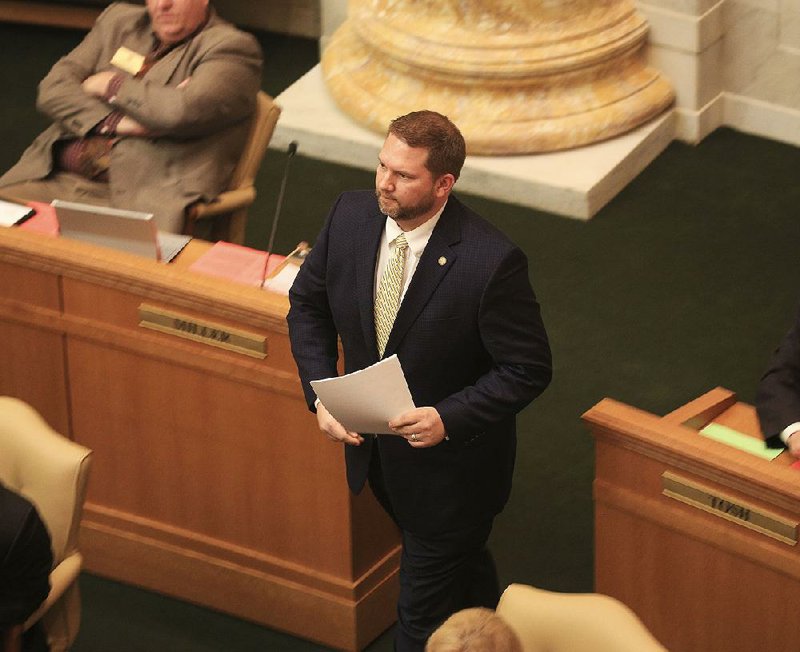By just one vote, the Arkansas House on Monday approved referring a proposed constitutional amendment to voters in 2020 that would limit state lawmakers to 12 consecutive years in office before requiring a four-year break.
The measure, Senate Joint Resolution 15 by Sen. Alan Clark, R-Lonsdale, passed 51-26 after minimal debate with 14 members not voting and nine voting present.
Currently, state legislators may serve up to 16 years in the House or Senate or of combined service in both chambers, although senators may serve more time because of two-year terms tied to redistricting.
SJR15 would remove the cap on total years in office, and instead apply a cap to consecutive years of service. After a four-year break, a person could run again for an additional term not to exceed 12 consecutive years.
The measure, which already passed the Senate, must head back to that chamber for final approval because the House made some minor amendments to the resolution. No action by the governor is required for the proposal to land on the ballot.
The House sponsor, Rep. Jim Dotson, R-Bentonville, noted that lawmakers face de facto term limits every two years for representatives and every four years for senators when running for re-election.
"The purpose of term limits is to limit power and advantages of incumbency," he said. "So if you have an incumbent who is running against someone who is not an incumbent, they obviously have a built-in advantage. After this resolution -- if it is adopted and approved by the voters -- is passed, after 12 years someone loses that advantage of incumbency."
[RELATED: Complete Democrat-Gazette coverage of the Arkansas Legislature]
Arkansas' current term-limit law was enacted in 2014 after voters approved Amendment 94 to the Arkansas Constitution. Before that, lawmakers were limited to three two-year House terms and two four-year Senate terms under Amendment 73, which voters approved in 1992.
The state is one of 15 in the U.S. with term limits. Nine states limit successive years in office, and six have lifetime caps.
Rep. John Walker, D-Little Rock, spoke against SJR15 from the House floor on Monday, calling it "self-serving." The 2014 amendment, Walker said, offered voters a "false pretense." The current proposal, in practice, would create 32-year terms with a four-year break to prepare for another campaign, Walker said.
"That does not open it up to the public in fairness, and it does not do us well because it means that it's self-serving legislation," Walker said. "It is not fair. It is not reasonable. Let us, if we talk about term limits, not be hypocritical. Let us not be self-serving."
SJR15 may also compete with another term-limit measure on the November 2020 ballot. In March, the private Arkansas Term Limits ballot committee filed a proposed constitutional amendment that would cap years in legislative office at 10. That proposal is similar to the committee's last one that was struck from the November 2018 ballot after a legal challenge. To get its latest proposal on the 2020 ballot, the committee will have to collect more than 89,000 valid signatures of registered voters.
Dotson alluded to Arkansas Term Limits' proposal, saying there has been significant public discourse around the issue in recent election cycles. This proposal tries to strike a compromise, he said.
"This would be to give the voters an option -- if anybody felt as if they had had no say or they were tricked by the Legislature by some strange reason in the existing term limits -- to give them an opportunity to vote on another option or leave it the same like it is right now," Dotson said.
Rep. Gayla McKenzie, R-Gravette, said while questioning Dotson that it will be confusing for voters at the ballot box because SJR15 and Arkansas Term Limits' proposal will have similar titles.
SJR15 is the second proposed constitutional amendment referred to the 2020 ballot by the General Assembly this legislative session. Lawmakers may refer up to three potential amendments every two years.
The first referral was House Joint Resolution 1018 by Rep. Jeff Wardlaw, R-Hermitage, which would permanently extend the state's half-percent sales tax for highways. Negotiations among legislative leaders are ongoing about what the third proposal should be or whether to have one at all. Lawmakers have said that a proposal to change the process by which citizen can initiate a ballot measure seems to have the broadest support.
Under SJR15, current legislators would be grandfathered into 16-year terms (or longer in the cases of some senators who draw two-year terms after once-a-decade redistricting).
"Those members who are currently serving would get to operate under the current law and serve 16 years -- up to 16 years -- while everyone else in the state would have to be limited to 12 years, thereby giving us in this chamber right now a definitive advantage over everybody else in the state?" Rep. Vivian Flowers, D-Pine Bluff, asked Dotson Monday.
Dotson noted that some current legislators have less than 12 years remaining on their terms.
"Really, it's trying to balance out and make it where we don't have a complete and total exodus by cutting everybody off that currently is serving, and then having a new fresh start on those subsequent years," he said.
A Section on 04/02/2019
